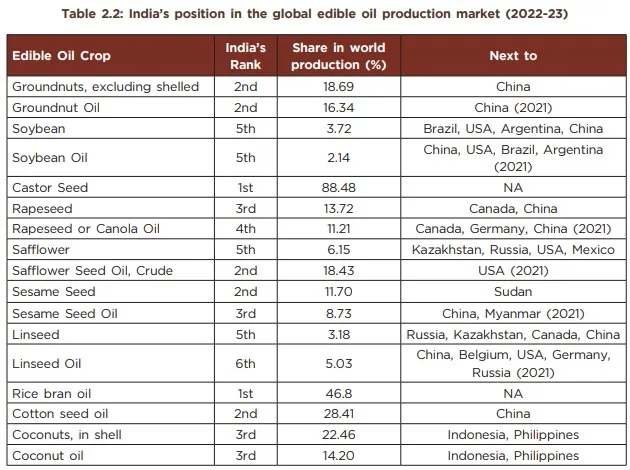Syllabus: GS3/ Economy
Context
- The report titled “Pathways and Strategies for Accelerating Growth in Edible Oils Towards the Goal of Atmanirbharta” was released by NITI Aayog.
Key highlights of the report
- India’s edible vegetable oil sector is a significant player on the global stage, ranking fourth behind the USA, China, and Brazil.
- In India there are seven major oilseed-growing states i.e. Rajasthan, Maharashtra, Madhya Pradesh, Uttar Pradesh, Haryana, Andhra Pradesh, and Karnataka.

- Demand: The report highlights that over the past decades, per capita consumption of edible oil in the country has seen rise, reaching 19.7 kg/year.
- This surge in demand has significantly outpaced domestic production, leading to a heavy reliance on imports to meet both domestic and industrial needs.
- Import: In 2022-23, India imported 16.5 million tonnes (MT) of edible oils, with domestic production fulfilling only 40-45% of the country’s requirements.
- This situation presents a substantial challenge to the country’s goal of achieving self-sufficiency in edible oils.
- Under a Business-As-Usual (BAU) scenario, the national supply of edible oil is projected to increase to 16 MT by 2030 and 26.7 MT by 2047.
Initiatives taken by Government
- National Mission for Edible Oils – Oil Palm (NMEO-OP): The mission is committed to escalating oil palm cultivation and elevating Crude Palm Oil production to 11.20 lakh tonnes by 2025-26.
- National Food Security Mission- Oilseeds (NFSM-OS) is being implemented by the government from 2018-19 to augment the availability of edible oils and reduce the import burden by increasing the production and productivity of oilseeds and area expansion of Oil Palm & Tree Borne Oilseeds.
- The government increased the Minimum Support Price (MSP) for Oilseeds.
Suggestions
- To achieve self-sufficiency in this sector, the report suggests several strategic interventions to bridge the existing gap and ensure long-term sustainability.
- The proposed strategy is structured across three key pillars:
- Crop Retention and Diversification,
- Horizontal Expansion: The Strategy aims to strategically increase the area dedicated to cultivating edible oil crops. Potential avenues include the utilization of rice fallow lands and highly suitable wastelands.
- Vertical Expansion: The Strategy focuses on enhancing the yield of existing oilseed cultivation. This can be achieved through improved farming practices, better-quality seeds, and advanced production technologies.
Source: PIB
Previous article
Legal Validity of Lie-Detector Tests